Photographs: Reuters B RAMAN
The third United States-Pakistan Strategic Dialogue for 2010 concluded at Washington DC on October 22.
The two sides fielded powerful delegations for the dialogue as they had done for the first two rounds held earlier this year in Washington DC and Islamabad.
The US delegation was headed by Secretary of State Hillary Clinton and included, among others, Defence Secretary Robert Gates.
The Pakistani delegation was headed by Foreign Minister Shah Mehmood Qureshi and included among others army chief General Ashfaq Parvez Kayani.
Apart from the formal talks at the delegation level, where hype pushed the cruel ground realities under the carpet, there were other opportunities for frank interactions, which the Americans utilised to tell the Pakistanis what they really thought and expected of them.
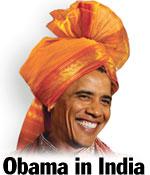
To quote from a report in Pakistan's Dawn daily on October 22, 'Pakistan's Ambassador Husain Haqqani later told the Pakistani media that President Obama's decision to 'drop in' during a meeting of the 'core group' of Pakistani officials with incoming US National Security Adviser Tom Donilon was 'not pre-announced, but it was pre-planned'.
He described it as 'the best-ever' meeting between a US president and a Pakistani delegation during which President Obama conveyed his 'unequivocal support to Pakistan and its democracy'.
President Obama, he said, regretted the mistakes the US had made in the past while dealing with Pakistan and assured the Pakistani delegation that Washington would not repeat those mistakes.'
'Washington's patience is wearing thin'
Image: Pakistan army chief General Ashfaq Parvez Kayani firing a sniper riflePhotographs: Reuters
Foreign Policy, a prestigious magazine for global issues, reported that President Obama 'personally delivered the tough love message that other top administration officials have been communicating since the Pakistani delegation arrived'.

Earlier, Secretary of State Hillary Clinton dropped in unannounced at another meeting between Special Representative Richard Holbrooke and General Ashfaq Parvez Kayani.
She delivered 'the message that Washington's patience is wearing thin with Pakistan's ongoing reluctance to take a more aggressive stance against militant groups operating from Pakistan over the Afghan border', the Foreign Policy report said.
'A similar message was delivered to General Kayani in another high-level side meeting on Wednesday morning at the Pentagon, hosted by US Defence Secretary Robert Gates and Joint Chiefs Chairman Admiral Michael Mullen,' Foreign Policy said.
'Pakistan's military can deliver, but doesn't want to'
Image: Local Lashkar members in a show-of-force in Khar, PakistanPhotographs: Adrees Latif / Reuters

'But this means that the US administration must find a way to incentivise both the Pakistani civilian and military leadership, which have differing agendas and capabilities,' the Foreign Policy report said, adding, '"The Obama side is calculating that Pakistan's military can deliver on subjects important to the US but doesn't want to, while the civilian leadership in Pakistan wants to, but isn't able", said one high-level participant who spoke with the magazine in between sessions.'
It is apparent from the reports on the dialogue that the US has not been able to find a way of making Pakistan act towards destroying the general headquarters of the terrorism led and inspired by Al Qaeda and located in Pakistani territory.
One is increasingly confused as to where this GHQ is located. Earlier, one thought it was located in North Waziristan.
The fierceness of the retaliatory action by the Pakistan army in response to a recent strike by a NATO helicopter in the Kurram Agency has created suspicions that at least part of the GHQ may be located there.
There have been other reports speculating about the possibility of its location in the Khyber Pakhtunkwa province.
The Pakistan army knows where the GHQ is
Image: Pakistani soldiers guard a street in the Swat valleyPhotographs: Abdul Rehman/Reuters
The Pakistan army uses the Punjabi Taliban against India in an attempt to force a change in the status quo in Jammu and Kashmir.
It has been using Al Qaeda, the Pashtun Taliban and their global jihadi allies for extracting money out of the US by dangling the threat of another 9/11 if it does not pay 'protection money' to the Pakistan army.

Despite the blunt words reportedly used by Obama, Clinton and Gates in more restricted interactions, more protection money was forthcoming in the form of a five-year commitment by the US of $2.29 billion in military aid, euphemistically called counter-terrorism assistance.
This will be in continuation of the allocation of $1.5 billion provided by the George W Bush administration in 2005 and of the civilian aid of $7.5 billion over a five-year period already being provided by the Obama administration since last year under the Kerry Lugar Act.
According to Dawn, Pakistan also receives hundreds of millions of dollars a year from the so-called Coalition Support Fund, which reimburses Pakistan for its military operations against militants.
The US reimbursed an amount of $1.3 billion to Pakistan for army operations conducted in 2008 and 2009, but has not yet paid for operations in 2010.
Announcing the military aid package, Clinton said the US had full confidence in Pakistan's commitment to the fight against terror.
US offers more carrots to Pak
Image: A New York police bomb squad member examines a suspicious package at the city's Times SquarePhotographs: Shannon Stapleton/Reuters
So long as this conviction does not change, Al Qaeda and its associates will remain where they are and will continue to plot and act against American nationals and interests.

More money was not the only carrot that Pakistan got during the dialogue. It made other gains in the form of the US commitment to uphold Pakistan's interests in Afghanistan, the promise of a separate visit to Pakistan by President Obama next year and an invitation to President Asif Ali Zardari to visit the US.
With the carrots continuing to flow from the US in spite of its inaction against Al Qaeda and Co, why should it act against the terrorists?
'Thus far and no further'
Image: Obama with Afghanistan President Hamid Karzai and Pakistan President Asif Ali ZardariPhotographs: Reuters
The pathetic apologies from the US for a recent raid by a NATO helicopter into Pakistani territory to neutralise terrorists who had attacked NATO positions in Afghanistan have shown to the Pakistan army the Achilles heel of the US -- its dependence on Pakistan for logistic supplies to NATO troops fighting in Afghanistan.

The confidence of the Taliban that the US would not act against it for sheltering Osama bin Laden and other Al Qaeda leaders in Afghan territory contributed to the 9/11 terrorist strikes in the US.
The present confidence of the Pakistan army -- that the US will not act against it for its inaction against Al Qaeda and its allies now sheltered in Pakistani territory -- will encourage more acts of terrorism against the US and other NATO countries in their respective homelands.
The Pakistan army literally blackmailed the US before the Strategic Dialogue by stopping the logistic supplies to Afghanistan.
Instead of teaching it a lesson for its blackmailing tactics, the US not only apologised, but followed it up with more favours for Pakistan.
This is not the way the US is going to prevail over Al Qaeda, the Taliban and their allies.

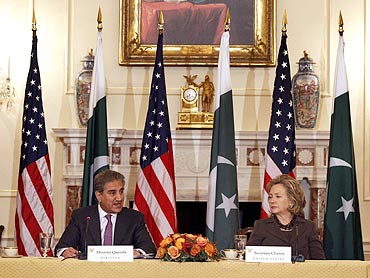
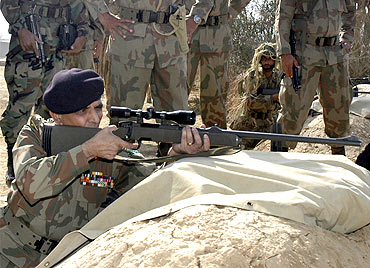
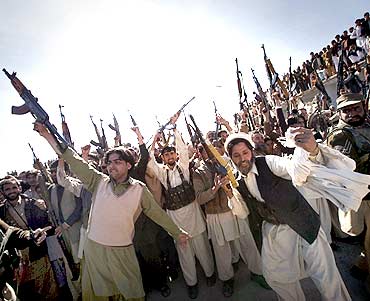
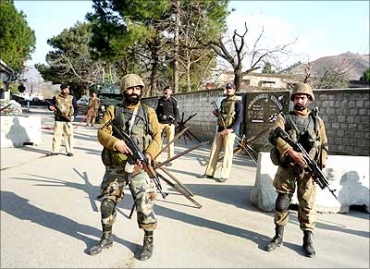
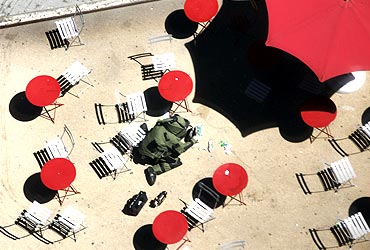
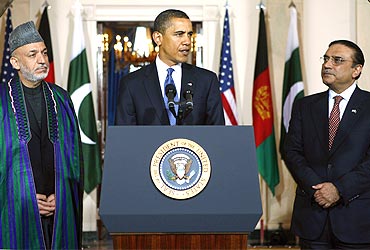
article